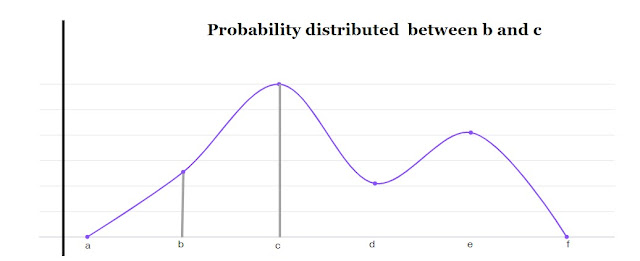Lebesgue Measure on ℝ
In my last blog on "Measuring a set", we see that how we can generalized the idea of length, area, volume for an set and we define special kind of set notions like sigma-algebra, algebra and define an arbitrary measure on that set we called that "Measure of a set."
As beginning of the last blog I told that our generalization should be same as our existing idea of length, area, volume. The Lebesgue Measure on ℝ is a generalization of length.
So there is two question,
1) Any subset of ℝ we take, can we measure it ?
2) The measure of the set and the length of the set is same ?
We know that, if ℝ be my set then P(ℝ) is the set of all subsets of ℝ. Let's see we can measure any element of P(ℝ) or not. To do that we first define equivalence definition of Lebesgue Measure on ℝ.
Lebesgue Measure on ℝ
Let E be any subset of ℝ, we consider the set T = { Φ or set of open intervals in ℝ}, if we can cover my set by union of elements of T ( i.e. E ⊂ ∪ Ik, k ∈ ℕ, where Ik is open intervals ) and we know for open intervals length is, ℓ[(a,b)] = b-a,
then Lebesgue Outer Measure of E on ℝ is,
λ*(E) = inf {Σ ℓ( Ik) : is sequence of open intervals with E ⊂ ∪ Ik}
[ here 'inf ' mean the infimum of the set]
Some instant interesting results we can get from above definition,
1) For every x ∈ ℝ, we have {x} is Lebesgue measurable set and measure of {x} is 0, i.e. λ*({x})=0
2) Every countable subset of ℝ is measure 0 in (ℝ, Mℓ, λ*(E) ).
3) For every interval I we get, λ*(I) = ℓ(I).
Lets look for some examples,
a) λ*([4,10]) = inf { Σ ℓ( Ik) : is sequence of open intervals with [4,10] ⊂ ∪ Ik}
The smallest cover for [4,10] is [4,10] ⊂ {4} ∪ (4,10) ∪ {10},
so addition will be [ λ*{4} + λ*(4,10) + λ*{10}] = 0+(10-4)+0 =6 = ℓ([4,10])
b) Try for λ*([4,10] ∪ [15,20]) ?
c)Try for λ*([4,10] ∪ [6,20]) ?
So our second answer is clear our definition of length of a set and measure of a set is same.
What about the first answer ?
Is every subset of ℝ is measurable ?
Answer is no, we can construct a non-measurable subset in ℝ.
Consider the interval [0,1) in ℝ, let x , y ∈ [0,1) let us define a relation x ~ y if x-y is a rational number. We can prove this is an equivalence relation of [0,1). Let {Ek} be the collection of the equivalence classes with respect to this equivalence relation. {Ek} is a disjoint collection and ∪ Ek = [0,1). Any two elements of [0,1) which are in one equivalence class differ by a rational umber and any two elements of [0,1) which are not in the same equivalence class differ by an irrational number.
Let P be a subset of [0,1) constructed by picking an element from each Ek .
We can prove that P is not a Lebesgue measurable set in ℝ.
So we conclude by a condition that,
A set E satisfy the Caratheodory criterion, which requires that for every A ⊂ ℝ,
λ*(A) = λ*(A ∩ E) + λ*(A ∩ Ec).
The set of all such E forms a sigma-algebra. For any such E, its Lebesgue measure is defined to be its Lebesgue outer measure: λ(E) =λ*(E).
A set E that does not satisfy the Caratheodory criterion is not Lebesgue-measurable.
So we generalized the concept of length in a measure theory and answer two fundamental question of Lebesgue measure in ℝ.



Comments
Post a Comment